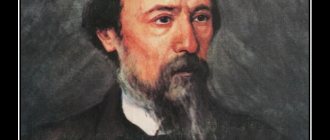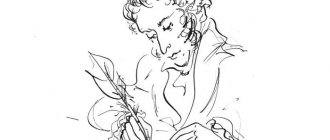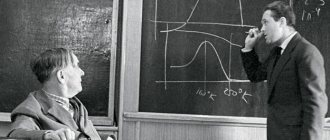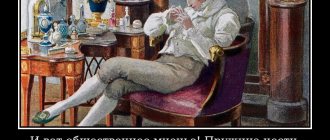Scene I
Room.
Salieri
Everyone says: there is no truth on earth. But there is no truth - and beyond. For me it's as clear as a simple scale. I was born with a love of art; As a child, when the organ sounded high in our ancient church, I listened and listened - involuntary and sweet tears flowed.
Illustration by M. A. Vrubel for the little tragedy of A. S. Pushkin “Mozart and Salieri”
I rejected idle amusements early; Sciences alien to music were hateful to me; stubbornly and arrogantly I renounced them and devoted myself to music alone. The first step is difficult and the first path is boring. I overcame early adversity. Craft I set as the foundation of art; I became a craftsman: I gave obedient, dry fluency to my fingers and fidelity to my ear. Having killed the sounds, I tore apart the music like a corpse. I believed harmony with algebra. Then I already dared, experienced in science, to indulge in the bliss of a creative dream. I began to create; but in silence, but in secrecy, not daring to think about glory yet. Often, after sitting in a silent cell for two or three days, forgetting both sleep and food, having tasted delight and tears of inspiration, I burned my work and coldly watched as my thoughts and sounds, born by me, disappeared, blazing, with light smoke. What am I saying? When the great Gluck appeared and revealed to us new secrets (Deep, captivating secrets), Didn’t I abandon everything that I knew before, What I loved so much, what I believed so fervently, And didn’t I cheerfully follow him Uncomplainingly, like one who was mistaken And was he sent by someone he met in a different direction? With strong, intense constancy I finally reached a high degree in boundless art. Glory smiled at me; I found consonances with my creations in the hearts of people. I was happy: I peacefully enjoyed My work, success, glory; also through the labors and successes of my friends, my comrades in the wondrous art. No! I have never known envy, Oh, never! - below, when Piccini was able to captivate the ears of wild Parisians, Below, when for the first time I heard Iphigenia’s initial sounds. Who will say that the proud Salieri would ever be a despicable envier, a snake trampled by people, alive, gnawing sand and dust powerlessly? Nobody!.. And now - I’ll say it myself - I’m now an Envious person. I envy; I am deeply, painfully jealous. - Oh heaven! Where is rightness when a sacred gift, When an immortal genius is not sent as a reward of burning love, selflessness, work, diligence, prayers - but illuminates the head of a madman, idle revelers?.. Oh Mozart, Mozart!
Enter Mozart
.
Mozart
Yeah!
you saw! but I wanted to treat you with an unexpected joke. Salieri
You are here!
- How long ago? Mozart
Now. I was coming to you, I had something to show you; But, passing in front of the tavern, I suddenly heard a violin... No, my friend, Salieri! You've never heard anything funnier... A blind violinist in a tavern Played out voi che sapete. Miracle! I couldn’t stand it, I brought the violinist to treat you to his art. Come in!
A blind old man
enters with a violin.
Something from Mozart for us!
The old man plays an aria from Don Juan;
Mozart laughs. Salieri
And can you laugh?
Mozart
Ah, Salieri! Are you really not laughing yourself?
Salieri, Mozart and the blind old man
Salieri
No.
I don’t find it funny when a worthless painter stains Raphael’s Madonna for me, I don’t find it funny when a despicable buffoon dishonors Alighieri with a parody. Let's go, old man. Mozart
Wait: here you go, Drink to my health.
The old man leaves.
You, Salieri, are not in a good mood today.
I will come to you at another time. Salieri
What did you bring me?
Mozart
No, yes;
trifle. The other night I was tormented by my insomnia, and two or three thoughts came into my head. Today I sketched them. I wanted to hear your opinion; but now You have no time for me. Salieri
Ah, Mozart, Mozart!
When am I not interested in you? Sit down; I'm listening to. Mozart
(for piano)
Imagine... who? Well, at least I’m a little younger; In love - not too much, but slightly - With a beauty, or with a friend - even with you, I am cheerful... Suddenly: a grave vision, Sudden darkness or something like that... Well, listen.
(Plays.)
Salieri
You came to me with this And could stop at the inn And listen to the blind violinist!
- God! You, Mozart, are unworthy of yourself. Mozart
Well, okay?
Salieri
What depth!
What courage and what harmony! You, Mozart, are a god, and you don’t know it yourself; I know I am. Mozart
Bah!
right? maybe... But my deity got hungry. Salieri
Listen: we will dine together at the Golden Lion tavern.
Mozart
Perhaps; I'm glad. But let me go home and tell Zhenya not to wait for me for dinner.
(Leaves.)
Salieri
I'm waiting for you; look. No! I cannot resist the fate of my Fate: I was chosen to Stop it - otherwise we all perished, We are all priests, ministers of music, I am not alone with my dull glory... What good will it do if Mozart is alive and still reaches new heights? Will he elevate art? No; It will fall again as he disappears: He will not leave us an heir. What's the use of it? Like some cherub, He brought us several songs of heaven, So that, having outraged the wingless desire In us, the children of the dust, he could then fly away! So fly away! the sooner the better.
This is poison, the last gift of my Izora. For eighteen years I have carried it with me - And often since then life has seemed to me like an unbearable wound, and I often sat with a careless enemy at the same meal, And I never bowed to the whisper of temptation, although I am not a coward, Although I feel the offense deeply, Even if it is little I love life. I still hesitated. How the thirst for death tormented me, Why die? I imagined: perhaps life will bring me unexpected gifts; Perhaps delight will visit me And a creative night and inspiration; Perhaps the new Hayden will create the Great - and I will enjoy it... As I feasted with the hated guest, Perhaps, I imagined, I would find my worst enemy; perhaps the worst insult will strike me from an arrogant height - Then you will not be lost, the gift of Izora. And I was right! and finally I found my enemy, and the new Hayden wonderfully intoxicated me with delight! Now is the time! cherished gift of love, Move into the cup of friendship today.
Quotes from famous people about Wolfgang Mozart
Mozart had different ears: with long and short ears and with dissimilar convolutions of the shells... If you believe the portraits of him that have come down to us, Mozart’s mask is insignificant for his genius... Kuzma Petrov Vodkin
Inconspicuous appearance, small stature... However, a genius lived in this inconspicuous body. Franz Xaver Nimeczek
Those who imagine him as a fragile, airy, radiant, refined, fluttering servant of the muses: a white wig, lace sleeves are naive. Excuse me! He was a very vital, very sensual and ardent gentleman. Epicurean. Rotten. Big child. Gallant seducer. Vlad Vasyukhin
...What strikes us about Mozart is his wonderful moral health. It is even more surprising when you remember his body, undermined by illness. Romain Rolland
In my feeling, Mozart always remained a child and reacted to music like a child. He worked for the public and, like a child, sought to be liked. Glen Gould
...In addition to the fact that he looked exactly like a child of that age, he also had age-appropriate behavior. For example, when he was composing a prelude at my request, his beloved cat entered the hall, which is why he immediately quit what he was doing, and we were not immediately able to return him to the instrument. Sometimes he jumped across the hall on a stick horse. Dines Berrington on playing seven-year-old Mozart
A frivolous, amorous moth, an eternal page in the service of divine harmony, an unreasoning conductor of certain higher energies - this image of Mozart, cultivated by popular literature for almost two centuries, acquired its finished form in Peter Schaeffer’s play “Amadeus”... [and]...became an integral property of mass consciousness . Levon Hakobyan
According to eyewitnesses, Mozart's hands were never idle. Even at the table, while eating, he constantly played with something: a fork, a knife, a plate, a salt shaker. That is, he was by nature a gaming person. In Mozart’s family it was customary to play a variety of games... Every Sunday afternoon they would shoot at targets, then play cards or skittles, and in winter they would chase ice cubes. Mozart died, leaving at least four and a half thousand guilders in debt (approximately 120 thousand modern dollars). He could not provide for his family, he had to rent an apartment, all the furniture, except for the piano and billiards, was pawned... With an impressive income and his father's inheritance, all this could only mean one thing: Mozart was a player. Harold Bauer
...No one had a harder life than him. It was a continuous struggle with poverty and illness. Romain Rolland
In the year of his death, the composer’s fixed income was 36 thousand marks, to which were added fees for “The Magic Flute” and “La Clemenza di Titus”; It is further known that in 1790 he earned at least 56 thousand marks and even in the crisis year of 1788 he should have received at least 50 thousand. For one piano (or composition) student, Mozart was paid 12 thousand a year; the rent for his last apartment in Rauensteingasse exceeded this amount by only one thousand marks... Manfred Wagner
When one day it came time to report his income, as was customary under Joseph II, Mozart wrote on his stamped declaration: “Too much for what I have to do - too little for what I could do.” Constanze Mozart
It is interesting that Mozart was not an “intellectual”, unlike many of his colleagues (both then and later). The books they have read can be counted on the fingers of their hands. Vladimir Markov
The idea of descendants about Mozart would be completely different if, during the preparation for the premiere of Idomeneo... father and son were not in different cities and the son would not have had the need to regularly inform his father about the progress of work... If not for this three-month correspondence, we They would most likely never have known that Mozart... knew Shakespeare and, moreover, competently criticized him. Levon Hakobyan
Mozart is still directly a son of the 18th century, with the then sweet sentimentality, with the then naive worship of the beauty and joys of life... Alexander Serov
Appraisals such as Mozart’s “grace” and “charm” have become common place. There are many hiding places in the soul of a great master. He also knows how to portray cruelty... Pablo Casals
Mozart is not made of porcelain, not of marble, not of sugar... a pretty Mozart, a perfumed Mozart, a constantly exalted Mozart, a touchy Mozart, an exaggeratedly sentimental Mozart are unacceptable... Alfred Brendel
Mozart is both a burgher and an aristocrat, but never a peasant or a troublemaker. He is young as a boy and wise as an old man - never outdated or modern. Ferruccio Busoni
Mozart's music, as it is now performed, embodies the highest degree of happy, carefree harmony. Those interpretations that are distinguished by heavenly perfection are most valued. Nikolaus Harnoncourt
There is a “divine” Mozart: his pen exudes gold, and musical ideas are inspired in him by angels. Standing next to him is a “giggling, lustful, diminutive dwarf,” with nothing but nonsense, ridicule and sex on his mind, and his tongue—in the words of Salieri from Peter Schaeffer’s drama—“dripping shit while his pen pours out divine revelations.” Manfred Wagner
[...What a pity that] such a rare artist was not a great person in other circumstances of his life. Franz Xaver Nimeczek
If a music book of records is ever written, Mozart will, of course, be mentioned in it more than once. Undoubtedly, he will be included in the “early development” category: there are hardly many other composers in the annals of history who began composing at the age of five. As for such an indicator as fertility, then according to it Mozart will take a high place, but far from the highest. The catalog of Mozart's works compiled by Ludwig Köchel contains 626 items (the last one is Requiem). If we add here works of dubious authorship, as well as those discovered relatively recently, at best there will be several dozen more. Meanwhile, Schubert, whose creative activity lasted only 17 or 18 years (against Mozart’s thirty), wrote nearly a thousand opuses (!), surpassing Mozart not only in absolute numbers, but also in efficiency. Levon Hakobyan
The youngest composer [should be recognized] is Wolfgang Amadeus Mozart, whose first works - Minuet and Trio for Clavier KV 1 - date back to 1761, when the boy was only four years old. From the Guinness Book of Music Records
How much work each of his pages cost Mozart, we will never know, just as we will not know at what cost those pages were given to him, where the sound of voices and their polyphonic structure are so ideally, with mathematical precision, balanced. Of course, they cost him dearly. I would even say they cost him his life, his whole life. Thirty-five years old. Giorgio Streller
Mozart... the pangs of creativity are completely unknown. He can do whatever he wants, but he only wants what he can. Romain Rolland
I am sure that Mozart, who seemed to Salieri to be an “idle reveler,” was in fact extremely diligent in music and worked hard on his gift of genius. Fyodor Chaliapin
It is not true that Mozart indulged in a riotous lifestyle. The exception is those rare cases when Schikaneder pushed him to do this, which mainly refers to the period of The Magic Flute. Johann Nepomuk Hummel
Mozart enjoyed great success with the ladies, despite his small stature; but he had an exceptional face, and he could charm any woman with his eyes alone. Luigi Bassi in conversation with Stendhal
Mozart... was small, fragile, homely and poor. And therefore his meetings with women were a continuous chain of failures. Alfred Einstein, German musicologist of the 19th – 20th centuries, author of the monograph “Mozart. Personality. Creation"
[Mozart] perceived the whole world of sounds that surrounded him, from church chorales to Viennese street songs. It didn’t bother him, on the contrary, he was amused and encouraged if he composed music in the presence of various noises: if they were singing in the next room, they were playing the piano under him, the clarinet was playing above him, and they were playing skittles in the street. Karl Barth
On the evening of the penultimate day before the premiere of Don Giovanni in Prague, when the dress rehearsal had already taken place, Mozart told his wife that he was going to write the overture that night. He asked to prepare punch for him and to stay with him to ward off sleep. She did so and told him various fairy tales in a row about Aladdin's magic lamp, about Cinderella and others, so that Mozart laughed until he cried. Nevertheless, he became so tipsy from the punch that he could not resist falling asleep and nodded off as soon as she was silent, and worked only under her voice... His wife advised him to lie down on the sofa, firmly promising to wake him up in an hour. But he fell asleep so deeply that she was sorry to touch him, and he slept for two hours. He woke up around five in the morning. At seven the scribes had already been called, and by this time the overture was ready. Some people are still trying to recognize in her music the moments when Mozart nodded off and woke up frantically. Constanze Mozart
It is a pity that Mozart lived at the end of the 18th century, when art served as entertainment, entertainment for a brilliant society, when they did not want deep, serious art; graceful, beautiful, light, brilliant - and into these forms Mozart had to squeeze his creativity, which was much deeper and more serious than was then required. Pavel Florensky
Mozart is the musician from whom time has removed us to the greatest extent; his music can be compared to talking in a low voice, whereas our audience is only used to shouting. Andre Gide
Mozart wrote equally beautifully refined quartets and waltzes for dancing; for a church organ - and for a mechanical clock or some kind of glass harmonica. He wrote for an orchestra with two flutes, five trumpets and four drums. The most interesting thing is that it never turned out what we call “hack work”; This is all first class music. He wrote to order, followed fashion, did not express his “soul” (the brightest things were written in the most difficult times for him), borrowed from himself and from others, entertained - he did not write, it seems, only “for eternity.” Vladimir Markov
Mozart never wrote “for eternity,” and that is why in most cases he creates for it. Alfred Einstein, German musicologist of the 19th – 20th centuries, author of the monograph “Mozart. Personality. Creation"
Mozart wasted his energies too generously and very often wrote not out of inspiration, but out of need... Pyotr Tchaikovsky
Oh Mozart! Divine Mozart! How little you need to know to idolize you! You are the eternal truth! You are a perfect beauty! You are an endless delight! You are the deepest and always clear! You are a mature husband and an innocent child! You, who experienced everything and expressed it in music! You, whom no one has surpassed and no one will ever surpass!.. Charles Gounod
Although Mozart was a believer - in the understanding of the church - the beliefs of Freemasonry increasingly replaced religion for him... Mozart, who, together with Johann Wolfgang Goethe and Gotthold Ephraim Lessing, were among the three most significant Freemasons of the 18th century, was of very great importance in the spiritual history of the union, since one of the greatest pieces of music of all time, namely The Magic Flute, would not have appeared without Freemasonry. Anton Neumayr
The fact that Mozart was a Freemason never stopped him from being a very devout and ardent Catholic. He did not skimp on the holidays dedicated to the saints dear to his heart... The Magic Flute is not an act of Masonic faith, but to a much greater extent a total expression of Mozart's philosophy, how he understood the fate and responsibilities of man... Marcel Brion
Mozart was a passionate, convinced Freemason [and] not only left us a number of significant works written specifically for Masonic rites and celebrations - the very idea of Freemasonry permeates his work. Many of Mozart's works, and not just The Magic Flute, are Masonic works, although the uninitiated are not aware of this. No, Mozart was no longer a good Catholic, at least in the understanding of the gloomy and fanatical priests. Alfred Einstein, German musicologist of the 19th – 20th centuries, author of the monograph “Mozart. Personality. Creation"
Mozart is a universal genius. Talking about Mozart is like talking about God... Edvard Grieg
What Mozart created is too diverse for a god, even for a god of music. These are the creations of man... a brilliant man among men. Leonid Gakkel
Mozart talks with God in exactly the same way as with us, without taking off his hat - but people don’t wear a hat to church! Charles Gounod
This religious, almost godless genius... does not fit into any ideal category. He... is an atheist and a believer, and a priest and a sorcerer at the same time... Pierre Jean Jouve
There is nothing more perfect than Mozart. The highest point of beauty. Sergey Taneyev
I was shocked by one place in Donna Anna's party. Alas, Mozart allowed himself to write here the most pitiful vocalise, staining his brilliant score... It is very difficult for me to forgive Mozart for this monstrous mistake. Now I feel ready to give part of my own blood in order to blot out this shameful page, as well as several other pages of the same kind, which - we must admit - are occasionally found in his works. The word “shameful” even seems too weak to me. In this passage Mozart committed one of the most heinous and reckless crimes against feeling, taste and common sense that can be found in the history of art. Hector Berlioz on Donna Anna's aria from the opera Don Giovanni
Some composers don't have bad compositions. Mozart is the first among them. Mikhail Voskresensky
While I love everything about Mozart, I will not claim that every single thing of his is chet d'ouevre. I know that any of his sonatas, for example, is not a great work, and yet I love each one because it is his, because this musical Christ imprinted it with his bright touch. Pyotr Tchaikovsky
Some works [of Mozart] seem to have been written by a genius of the highest order, others by an idle reveler who is not entirely without musical talent... I once said... when I was asked to describe Mozart in a few words: “The best and the worst of the great composers.” Valery Afanasyev
The Requiem breathes with the purest feeling of Christian faith. Mozart sacrificed his secular charms and charms in it. Romain Rolland
The Requiem is Mozart's last and best work, it is much higher than everything he wrote before. Caesar Cui
Mozart's famous Requiem... cannot be considered his best work... In the Requiem, Mozart had nowhere to develop his most striking quality - the art of musical characterization. On the other hand, he lacked the strong, deep religious feeling so necessary for composing church music. This explains some of the dryness of other parts of his Requiem. The best numbers of this, in any case, great work should be recognized as the excellent poetic introduction, with a double fugue at the end, and the touching Lacrimosa, which always produces a charming effect on the audience. Pyotr Tchaikovsky
...A serious miscalculation was made in that part... of Mozart's Requiem, which begins with the words Lacrimosa dies illa - "This day of tears"... In the fact that "Lacrimosa", starting on an unusually heartfelt, sublimely mournful note, ends with a pompous major apotheosis, one can see a certain sin against good taste and a sense of proportion - this “kitsch” really doesn’t fit in with the final words: “Merciful Jesus, Lord, grant them peace.” But Mozart has nothing to do with this: he died almost immediately after completing the previous part of the Requiem, having only managed to sketch out the first seven bars of Lacrimosa. The rest was completed by his student Franz Xaver Süssmayr. However, the vain logic of mass perception dictates its own laws: the whole world fell in love with “Lacrimosa” in Süssmayr’s “kitsch” version much more than the rest of Requiem. If, not today, tomorrow, irrefutable proof suddenly turns up that Mozart wanted to end Lacrimosa on a quiet note, no one will want to take him into account. Levon Hakobyan
[There are] a lot of absurdities in it, and this opera could be written twenty times more interesting on stage than Mozart did. Sergei Prokofiev about “The Marriage of Figaro”
A dry and boring balancing act, with a topic that is very absurdly jostled in one place. Vladimir Stasov about the overture to The Magic Flute
Never has a more mindlessly stupid plot been accompanied by more captivating music. Pyotr Tchaikovsky on The Magic Flute
Despite all its not always intelligible Masonic overtones, “The Magic Flute” remains the most democratic of Mozart’s operas, because it was created... with the most plebeian audience in mind. Therefore, it is natural that [there are] more “hits” in it than in any other Mozart opera. Levon Hakobyan
As long as the bulk of the audience enjoys the obvious, the higher meaning will not be hidden from the initiated. Johann Wolfgang Goethe on The Magic Flute
How to write truthful music to text imbued with falsehood? ...the only way out is to do as Mozart did: forget about the libretto and surrender to musical dreams. Romain Rolland on The Magic Flute
It is not “The Abduction from the Seraglio” or “The Magic Flute” that belongs to those works that are Mozart’s highest achievements, but “Don Giovanni”, “The Marriage of Figaro” and three or four of his most perfect symphonies. Bernard Show
Long live Don Juan - a masterpiece of the human mind! Long live Mozart, god of music! Dominique Ingres
Mozart is so easy to understand. You can listen to it absentmindedly, relaxing, minding your own business, reading the newspaper. Glen Gould
Most difficult composer? - Mozart! Svyatoslav Richter
Oh, how difficult it is to overcome the lightness of Mozart! Nathan Perelman
I wish I could write as simply as Mozart! Richard Strauss
On his last evening, Hesse listened to Mozart on the radio - Sonata C major KV 309. He loved Mozart in his old age more than anything in the world. Then he fell asleep and in the morning he died peacefully in his sleep - on August 9, 1962... The image of Mozart seemed to Hesse to be the embodiment of the very spirit of music, the fulfillment of the ideal of a “perfect”, “immortal” person, who reconciled all the contradictions within himself, who coordinated his life with “cosmic harmony” peace. Sergey Averintsev
Mozart is physically calming. I explain this by the extraordinary transparency of his writing: not a single extra voice and often only two voices. We do not need to do the work of choice: the composer has already selected everything, he has already solved the “minimum problem” and the listener is thereby spared the slightest tension. There are many light, high sounds and, on the contrary, few low, viscous sounds; If world music is likened to a chord, then Mozart plays the highest, brightest note in this chord. And such a sound cannot but enlighten the soul, just as the absence of fuss cannot but soothe... Leonid Gakkel
Mozart's music affects me too directly, and it makes me really sick. Georges Bizet
If a person feels bad, perhaps he should listen to Mozart. Because his sadness is very specific. She always has a glimmer of hope, and a person should not lose it while he is alive. Vladimir Spivakov
With shocking immediacy, Mozart's music, like a mirror, shows us our reflection. Nikolaus Harnoncourt
Everyone asks: why did Mozart die? From music, I would answer without hesitation. Giorgio Streller
Mozart undermined his health by getting mixed up with women. Karl Friedrich Zelter – Goethe
Yes, Mozart was poisoned, but it was not Antonio Salieri who poisoned him, but someone else. Francis Carr
...I deny the legend that Mozart was poisoned by Salieri... It must be admitted: the constantly animated spirit strained Mozart’s bodily strength, which led to his premature death. Johann Nepomuk Hummel
...In Mozart's year 1956, medicine decisively declared: [Mozart] was a victim of mercury poisoning! And how can you not fall into temptation and just say: everything is very simple, Mozart died of a venereal disease, which was then treated with mercury. Johannes Dalchow, Günther Duda, Dieter Kerner
During a meeting of the Central Institute for Mozart Studies in Salzburg on August 28, 1964, employees of the “Austrian music press” were ready to publish any, the most absurd diagnosis regarding the death of Mozart, but on one condition: his death must be “natural”! Johannes Dalchow, Günther Duda, Dieter Kerner
In order to wean his subjects from excessive ritualism, Joseph II - an inveterate rationalist and opponent of all sorts of excesses (it was not for nothing that Mozart once called him a “miser”!) - in the 1780s he took energetic measures to radically simplify the process of burying the dead... the right to an expensive individual burial was reserved only for representatives of the richest and most noble families. All the rest were buried in common graves, five to six people in each.
Levon Hakobyan
...King Ludwig of Bavaria... visited Constance in Salzburg [and] directly asked her why her husband's grave was lost. The king heard from Mozart's widow a very incomprehensible, hastily invented story that she often visited St. Mark's cemetery, wandered between the graves and saw so many crosses, which is why she decided that installing them was the responsibility of the spiritual authorities. Igor Belza
If I am ever destined to find myself in heaven, then first of all I will ask there about Mozart and only then about Augustine and Thomas, about Luther, Calvin and Schleiermacher. Karl Barth
More on the topic:
- Biographies of Austrian composers
- Brief biography of Franz Schubert
- Brief biography of Johann Strauss
Popular:
- Woman. Young woman. Lady
- Life and destiny
- Catchphrases from the Bible
Comments:
Scene II
A special room in a tavern; piano. Mozart
and
Salieri
at the table.
Salieri
Why are you cloudy today?
Mozart
Me?
No! Salieri
Are you really upset about something, Mozart?
A good dinner, nice wine, And you are silent and frowning. Mozart
Frankly, My Requiem worries me.
Salieri
A!
Are you composing Requiem? How long ago? Mozart
A long time ago, about three weeks.
But a strange case... I didn’t tell you? Salieri
No.
Mozart
So listen.
About three weeks ago, I came home late. They told me that someone came for me. Why - I don’t know. All night I thought: who could it be? And what does he need in me? The next day the same one came in and didn’t find me again. On the third day I played on the floor with my boy. They called me; I went out. A man dressed in black bowed politely, ordered Me a Requiem and disappeared. I sat down immediately and began to write - and from that time on my black man did not come for me; And I’m glad: I would be sorry to part with my work, even though Requiem is completely ready. But meanwhile I... Salieri
What?
Mozart
I'm ashamed to admit this...
Salieri
What?
Mozart
My black man gives me no rest day and night.
He follows me everywhere like a shadow. And now it seems to me that he is the third one sitting with us. Salieri
And, that's enough!
What kind of childish fear is this? Dispel your empty thoughts. Beaumarchais told me: “Listen, brother Salieri, when dark thoughts come to you, open a bottle of champagne or re-read The Marriage of Figaro.” Mozart
Yes!
Beaumarchais was your friend; You composed “Tarara” for him, a glorious thing. There is one motive... I keep repeating it when I'm happy... La la la la... Oh, is it true, Salieri, that Beaumarchais poisoned someone? Salieri
I don’t think so: he was too funny for such a craft.
Mozart
He's a genius, like you and me.
And genius and villainy are two incompatible things. Isn't it true? Salieri What
do you think?
(Throws poison into Mozart's glass.)
Well, drink up.








